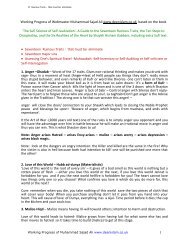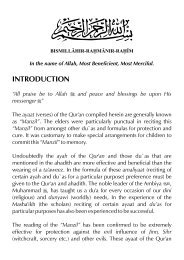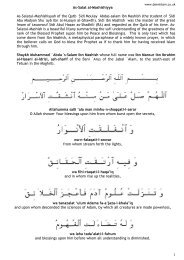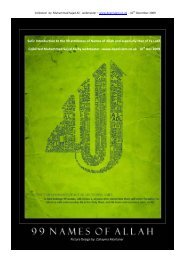Sufi Introduction to the 99 Names of Allah and sufi ... - Deen islam
Sufi Introduction to the 99 Names of Allah and sufi ... - Deen islam
Sufi Introduction to the 99 Names of Allah and sufi ... - Deen islam
Create successful ePaper yourself
Turn your PDF publications into a flip-book with our unique Google optimized e-Paper software.
Collected by Muhammad Sajad Ali - webmaster – www.deen<strong>islam</strong>.co.uk - 10 th December 2009<br />
<strong>to</strong> remain, continue, endure<br />
<strong>to</strong> be permanent, everlasting, constant<br />
<strong>to</strong> survive forever<br />
<strong>to</strong> be incessant, continuous, endless<br />
The term Bâqî is not specifically used as a Beautiful Name in <strong>the</strong> Qur'ân.<br />
The term Abqâ, also from <strong>the</strong> b-q-y root, is used in <strong>the</strong> Qur'ân (20:73) where it is commonly<br />
translated as <strong>the</strong> Most Lasting, Ever Lasting or Most Abiding.<br />
The term baqiyyah is used in <strong>the</strong> Qur'ân (11:116) <strong>to</strong> describe persons <strong>of</strong> excellence, those who<br />
possess spiritual underst<strong>and</strong>ing <strong>and</strong> inner discrimination, those who possess a quality <strong>of</strong> attending<br />
<strong>to</strong> that which is eternal.<br />
The related term baqâ', which is from <strong>the</strong> same b-q-y root, is <strong>of</strong>ten translated as eternal life. In<br />
<strong>the</strong> state <strong>of</strong> baqâ' bi-llâh <strong>the</strong>re is a return from <strong>the</strong> ephemeral <strong>to</strong> <strong>the</strong> eternal, a shift from <strong>the</strong><br />
egocentric <strong>to</strong> <strong>the</strong> Divine, where all that remains is <strong>the</strong> eternal Thou. The return <strong>to</strong> <strong>the</strong> Everlasting,<br />
<strong>the</strong> return from one's worldly preoccupation with <strong>the</strong> ephemeral, <strong>the</strong> shift away from one's own ego<br />
being treated as <strong>the</strong> center <strong>of</strong> life, is <strong>of</strong>ten called fanâ' which literally means <strong>to</strong> fade away,<br />
dwindle, recede or come <strong>to</strong> an end.<br />
yâ bâqî anta al-bâqî is a powerful wazîfa which can be translated as o' Everlasting One, Thou art<br />
The Everlasting One.<br />
(Also written as al-baqi, al-baaqee, al-baaqee, <strong>the</strong> Ever-Lasting: ya baqi, ya baaqee, ya baaqee)<br />
97. Al-Wârith- The Inheri<strong>to</strong>r, The Supreme Heir<br />
The Inheri<strong>to</strong>r. He who is <strong>the</strong> Real Owner <strong>of</strong> all riches. His wealth endures, while even <strong>the</strong> richest<br />
mortals must one day leave all <strong>the</strong>ir wealdi behind. The one whose existence remains. The<br />
supporter <strong>of</strong> all or one who remains alive even after everyone or everything dies<br />
YA WARITHU; O Inheri<strong>to</strong>r! Long life will be enjoyed by those who <strong>of</strong>ten invoke this Name. If this<br />
name is repeated 100 times at sunrise, protection will be given against all sorrows, grief, hardship<br />
<strong>and</strong> calamities. Moreover <strong>the</strong> reader will dies as a Mu‘ min Insha-<strong>Allah</strong>. Anyone who desires <strong>to</strong> be<br />
safeguarded against perplexities, perturbation <strong>and</strong> disturbances should repeat this name 1000<br />
times between Maghrib <strong>and</strong> esha. Any person who reads this name 100 times at <strong>the</strong> time when<br />
<strong>the</strong> sun is rising he will have no sadness.<br />
The One who remains after all <strong>of</strong> creation has perished. The One <strong>to</strong> whom all returns.<br />
The One who has everlasting ownership <strong>of</strong> all that has ever been <strong>and</strong> that will ever be.<br />
The One <strong>to</strong> whom all possessions return when <strong>the</strong> possessor is gone. The One who inherits all that<br />
we have done.<br />
From <strong>the</strong> root w-r-th which has <strong>the</strong> following classical Arabic connotations:<br />
91







